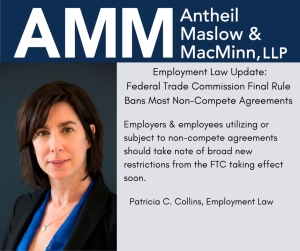The Federal Trade Commission's Final Rule Bans Most Non-Competes
On April 23, 2023, the Federal Trade Commission (“FTC”) issued a final rule imposing a broad restriction on non-competition agreements (“Final Rule”). The Final Rule requires employers to rescind existing non-compete agreements and would preempt conflicting state laws. The Final Rule is effective 120 days from its publication in the Final Register.
The Final Rule defines “non-compete clauses” as follows: any agreement that prevents a worker from, or penalizes a worker for, seeking or attempting to seek employment with any employer after the termination of their current employment.
The Final Rule mandates that it is a prohibited unfair method of competition to enter into or “attempt to enter into” a non-compete clause with an employee, or to enforce an existing non-compete agreement, or to represent to an employee that they are subject to a non-compete without a good faith basis to believe they are.
Accordingly, the Final Rule not only requires employers not to enter into or “attempt to enter into” employee non-compete agreements, it also requires employers to rescind their existing non-compete agreements, and then notify the current and former employees that the non-compete is rescinded within forty-five days of the rescission. The Final Rule provides a form for the notice of rescission. The obligation to rescind existing non-compete clauses does not apply to where a cause of action related to a non-compete clause accrued prior to the effective date.
No Hire Clause Called into Question
Many companies use restrictive covenant agreements with key employees to guard against economic harm to the company by an employee who takes a job with the company’s competitor and/or tries to persuade the company’s customers to stop doing business with the company. These are particularly common with sales staff. In Pennsylvania, these covenants will generally be upheld if they are narrowly drawn to protect the employer’s legitimate business interests and if the employee has been given meaningful consideration in exchange for agreeing to be bound by the covenants. To learn more about Noncompetes, visit our Navigating Noncompetes blog series in the AMM Employment Law Blog.
Companies recognize that merely doing business with other firms can also be risky when it comes to protecting their interests in employees and customers. Consequently, it has become customary to include “no hire” provisions in contracts to prohibit a party from hiring away the other party’s staff. These clauses are particularly common in agreements in the technology field and in non-disclosure agreements that parties often enter into when evaluating whether or not to begin a business relationship. The viability of these provisions is in doubt in Pennsylvania, where the Pennsylvania Superior Court struck down a no-hire clause in a service agreement earlier this year. The Pennsylvania Supreme Court has agreed to hear the case.
In Pittsburgh Logistics Systems, Inc. v. BeeMac Trucking, LLC, the trial court held that the no-hire clause was unenforceable because it prevented individuals from seeking employment with certain companies even though those individuals had not agreed to or been compensated for the restriction. It is important to note that in a separate action, Pittsburgh Logistics Systems (“PLS”), the company attempting to enforce the restrictions against BeeMac, was unsuccessful in its efforts to enforce the restrictive covenants contained in four employees’ employment agreements, each of whom left to work at BeeMac. The trial court concluded that the covenant not to compete was oppressive and overly broad since it had an unlimited geographic scope. The court viewed PLS as having “unclean hands” and refused to enforce the restriction at all.
The Superior Court agreed with the trial court and held that the no-hire clause was unenforceable as a matter of law. The Superior Court was influenced by the lower court’s holding that the non-compete covenants in the employment agreements were not enforceable, noting that it would be unfair for PLS to achieve the same result by using a contractual no-hire provision in its contracts with other companies.
Two Superior Court judges dissented, drawing a distinction between a no-hire provision in a contract between two companies and a non-compete clause binding employees. They reasoned that the no-hire clause did not restrict the employees’ actions; rather, the clause was a bargained-for restriction in recognition of the fact that BeeMac would have access to PLS employees and know-how. The dissenting opinion suggests that the correct analysis is whether the no-hire clause was a reasonable restraint on trade. Using that test, the dissenting judges would have enforced the clause and granted the injunctive relief requested by PLS to prevent BeeMac from “enjoy[ing] the benefit of its purported breach” and “leverag[ing] the specialized knowledge that PLS’s former employees acquired while under its employment.”
It will be interesting to see how the Pennsylvania Supreme Court views these issues when it hears this case. Stay tuned for further developments.






















